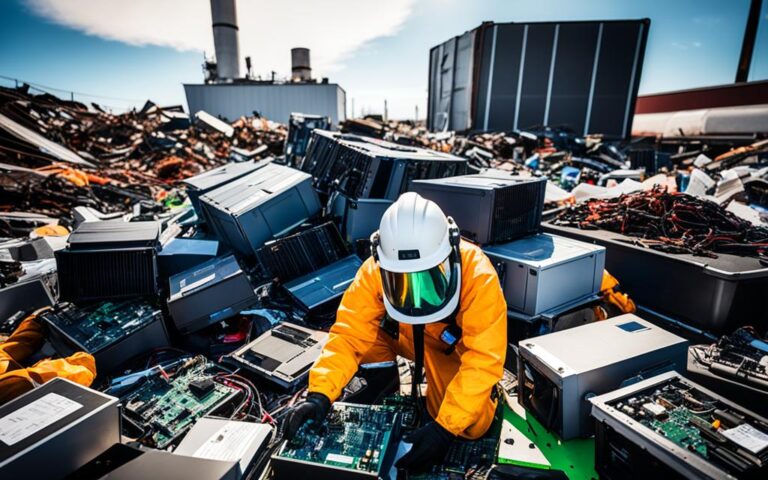Building Partnerships for Effective Server Recycling Programs
Server Recycling Partnerships are crucial in addressing the expanding issue of e-waste management. With the rapid advancement of technology, the lifespan of servers is becoming shorter, leading to a higher volume of discarded electronic equipment. To tackle this challenge and promote sustainable practices, NGOs are playing a pivotal role in building partnerships for effective server recycling programs.
NGOs advocate for responsible IT recycling by organizing grassroots initiatives, community recycling drives, and educational programs. These initiatives create awareness and foster a sense of responsibility among individuals and businesses towards sustainable e-waste management. By partnering with local communities, schools, and technology companies, NGOs are driving the movement towards a circular economy.
Through collaborations with public and private entities, NGOs are paving the way for comprehensive IT recycling programs. Public-private partnerships enable cost-effective solutions for e-waste management, while collaborations with technology companies facilitate the repurposing of e-waste into new technological solutions. These partnerships not only address the immediate challenges of server recycling but also contribute to building a sustainable future.
Moreover, NGOs are actively engaged in policy advocacy, shaping the future of IT recycling. Through research, lobbying, and public campaigns, they provide evidence-based insights to governments and influence policy changes on national and international levels. Their global impact is evident through international collaborations, participation in global forums, and research publications.
As the world confronts the mounting e-waste crisis, it is essential to recognize the multifaceted role of NGOs in IT recycling and server recycling partnerships. By working collaboratively, we can create a future where responsible e-waste management is the norm, safeguarding the environment and ensuring a sustainable future for generations to come.
Grassroots Initiatives: The Foundation of NGO-Led E-Waste Management
NGOs play a significant role in IT recycling through grassroots initiatives. These organizations understand that raising awareness at the community level is the first step in effective e-waste management. Through local workshops, educational programs, and community recycling drives, NGOs are making strides in educating the public about responsible electronic disposal.
One of the key strategies employed by NGOs is organizing community recycling drives. These drives serve as collection points for larger NGO partnerships and also offer an opportunity to educate the public on the role of NGOs in e-waste management. By creating accessible drop-off locations, NGOs facilitate the proper disposal of electronic devices while raising awareness about the importance of responsible e-waste management.
Educational programs are another crucial component of NGO-led e-waste management. Collaborating with schools and community centers, NGOs aim to build awareness and a sense of responsibility for sustainable e-waste management practices. These programs provide valuable information about the proper disposal methods, the environmental impact of e-waste, and the potential for recycling and repurposing electronic devices.
“Our grassroots initiatives are rooted in the belief that change starts at the community level. By educating individuals and empowering them to make responsible choices, we pave the way for a more sustainable future,” said Sarah Green, Director of Programs at EcoRecycle, a leading NGO in e-waste management.
Through grassroots initiatives, NGOs are not only addressing the immediate challenges of e-waste but also laying the groundwork for long-term behavior change. By engaging local communities, they create a ripple effect that extends beyond individual actions, fostering a culture of responsible e-waste management.
NGO-Led Grassroots Initiatives: Inspiring Change at the Local Level
NGOs have recognized the power of grassroots initiatives in transforming e-waste management practices. By partnering with local organizations, schools, and community centers, they reach a diverse range of individuals and help them understand the importance of responsible disposal and recycling.
These initiatives are successful because they combine educational efforts with practical solutions. They not only provide information but also offer accessible avenues for recycling, making it easier for people to dispose of their e-waste responsibly.
Additionally, grassroots initiatives foster a sense of community involvement and ownership, empowering individuals to take an active role in addressing the e-waste problem. By highlighting the impact of their collective actions, NGOs inspire a sense of accomplishment and motivate others to follow their lead.
The Key Benefits of Grassroots Initiatives in E-Waste Management
Grassroots initiatives led by NGOs have numerous benefits in the realm of e-waste management:
- Increased awareness: Grassroots initiatives help educate individuals about the environmental consequences of improper e-waste disposal and the importance of responsible recycling.
- Behavior change: By providing practical solutions and engaging communities, grassroots initiatives inspire individuals to adopt sustainable e-waste management practices.
- Collaboration: NGOs collaborate with local organizations, schools, and community centers, harnessing the strength of collective efforts in creating a more sustainable future.
- Access to recycling: Community recycling drives established through grassroots initiatives provide convenient access to proper e-waste disposal, ensuring that electronic devices are recycled rather than ending up in landfills.
- Empowerment: Grassroots initiatives empower individuals to become agents of change in their communities and advocate for responsible e-waste management.
Case Study: The Impact of Grassroots Initiatives on E-Waste Recycling Rates
A study conducted by Sustainable E-Waste Solutions (SEWS), an NGO dedicated to e-waste management, examined the effect of grassroots initiatives on e-waste recycling rates in a local community. Over the course of six months, SEWS implemented a series of awareness campaigns, educational workshops, and community recycling drives.
The study found that during this period, the community’s e-waste recycling rates increased by 30%. The success was attributed to the increased awareness and accessibility created by the grassroots initiatives. By engaging community members through workshops and providing convenient drop-off locations, SEWS successfully mobilized individuals to take a proactive approach towards responsible e-waste management.
SEWS believes that this case study exemplifies the significant impact grassroots initiatives can have on e-waste recycling rates. By replicating these initiatives in other communities, NGOs can contribute to a larger-scale transition towards sustainable e-waste management.
| Benefits of Grassroots Initiatives in E-Waste Management | Description |
|---|---|
| 1. Increased awareness | Grassroots initiatives help educate individuals about the environmental consequences of improper e-waste disposal and the importance of responsible recycling. |
| 2. Behavior change | By providing practical solutions and engaging communities, grassroots initiatives inspire individuals to adopt sustainable e-waste management practices. |
| 3. Collaboration | NGOs collaborate with local organizations, schools, and community centers, harnessing the strength of collective efforts in creating a more sustainable future. |
| 4. Access to recycling | Community recycling drives established through grassroots initiatives provide convenient access to proper e-waste disposal, ensuring that electronic devices are recycled rather than ending up in landfills. |
| 5. Empowerment | Grassroots initiatives empower individuals to become agents of change in their communities and advocate for responsible e-waste management. |
Collaborative Efforts: The Power of NGO Partnerships for Recycling
NGO partnerships for recycling, especially public-private partnerships, are highly effective in creating comprehensive IT recycling programs. These collaborations between NGOs, local governments, and private corporations bring together diverse expertise and resources to develop cost-effective solutions for e-waste management while fulfilling corporate social responsibility objectives.
By joining forces, NGOs and their partners can tackle the complex challenges associated with e-waste on a larger scale. Tech industry collaborations, for example, go beyond recycling by repurposing e-waste into new technological solutions, contributing to a circular economy while minimizing waste. This innovative approach not only addresses the environmental impact of e-waste but also opens up new avenues for sustainable development and job creation.
“Collaboration is the key to unlocking the true potential of IT recycling and e-waste management. NGOs, local governments, and private corporations working together can bring about a transformative change and create a more sustainable future.”
Case Studies: Transformative Power of NGO Partnerships for Recycling
Case studies offer valuable insights into the transformative power of NGO partnerships for recycling, demonstrating their real-world impact on both policy and public perception. By showcasing successful examples, these case studies inspire other organizations to utilize collaborative efforts in their own recycling initiatives.
One such case study involves a collaboration between an NGO, a local government, and a technology company. Together, they established a comprehensive e-waste collection and recycling program that not only prevented harmful materials from entering landfills but also created opportunities for responsible disposal and sustainable reuse.
Another notable case study highlights the importance of public-private partnerships. In this collaboration, an NGO partnered with a leading electronics manufacturer to develop a closed-loop system, where old electronic devices were collected, refurbished, and reintroduced into the market. This circular model not only reduced e-waste but also promoted resource conservation and extended the lifespan of electronic products.
These case studies illustrate the power of collaboration in addressing the e-waste crisis while highlighting the benefits of NGO partnerships for recycling. They serve as beacons of hope, showing what can be achieved when organizations come together with a shared vision of a greener and more sustainable future.
| Benefits of NGO Partnerships for Recycling | Example |
|---|---|
| Enhanced expertise and resources | NGO collaboration with local governments and private corporations leads to more effective and innovative recycling programs. |
| Cost-effective solutions | Partnerships enable the development of sustainable e-waste management systems without placing excessive financial burden on individual organizations. |
| Repurposing and recycling | Tech industry collaborations repurpose e-waste, contributing to a circular economy and reducing waste. |
| Real-world impact | Case studies demonstrate the transformative effects of NGO partnerships, inspiring others to adopt similar collaborative approaches. |
Policy Advocacy: Shaping the Future of IT Recycling
NGOs play a critical role in shaping policies related to IT recycling and e-waste management through research, lobbying, and public campaigns. Research and data collection form the building blocks for policy advocacy, providing evidence of e-waste scale, environmental impact, and the effectiveness of recycling programs.
By gathering and analyzing data on the magnitude of e-waste and its consequences, NGOs highlight the urgency of implementing sustainable IT recycling practices. These findings serve as compelling evidence for policymakers to take action and develop comprehensive regulations to address the e-waste crisis.
“Data-driven policy advocacy is the key to driving change in the IT recycling landscape,” emphasizes Jane Thompson, a leading environmental researcher. “The numbers don’t lie, and they expose the need for systematic and sustainable solutions.”
“The numbers don’t lie, and they expose the need for systematic and sustainable solutions.”
Lobbying efforts play a crucial role in policy formulation. NGOs actively engage with local governments, presenting their research findings, and advocating for stricter regulations and incentives for responsible IT recycling. Additionally, these organizations participate in international environmental forums, where they collaborate with policymakers from different countries to develop global standards for e-waste management.
Public campaigns are another avenue through which NGOs exert their policy advocacy influence. These campaigns aim to raise public awareness about the environmental impact of improper e-waste disposal and mobilize mass support for policy changes. By educating the public and fostering a sense of responsibility, NGOs empower individuals to demand change and push for sustainable IT recycling practices.
Creating Collaborative Solutions
Addressing the immediate challenges of IT recycling requires collaborative efforts between businesses, institutions, and governments. NGOs act as catalysts in bringing diverse stakeholders together to work towards a common goal.
“Partnerships between NGOs, businesses, and governments are crucial for driving systemic change in e-waste management,” affirms David Evans, CEO of a leading technology company. “By leveraging our collective expertise and resources, we can create innovative and sustainable solutions that benefit not only the environment but also our economies.”
“Partnerships between NGOs, businesses, and governments are crucial for driving systemic change in e-waste management.”
Through collaborative efforts, these stakeholders can establish effective recycling infrastructures, implement extended producer responsibility initiatives, and promote the development of a circular economy. By working together, we can address the immediate challenges of IT recycling and lay the groundwork for long-term, systemic change in e-waste management.
The role of NGOs in policy advocacy cannot be overstated. Their research, lobbying, and public campaigns provide the knowledge, influence, and mobilization needed to shape the future of IT recycling and promote a sustainable and responsible approach to e-waste management.
Conclusion: The Multifaceted Role of NGOs in IT Recycling and E-Waste Management
NGOs play a diverse and impactful role in IT recycling and e-waste management. Their grassroots initiatives, collaborative efforts, and policy advocacy contribute to a culture of responsible e-waste management. Through local workshops, educational programs, and community recycling drives, NGOs are raising awareness at the community level and educating the public about responsible electronic disposal. This foundation of grassroots initiatives forms the basis for effective NGO-led e-waste management.
NGO partnerships for recycling, especially public-private partnerships and collaborations with technology companies, bring about large-scale change and contribute to a circular economy. These partnerships not only involve the collection and recycling of electronic waste, but also focus on repurposing e-waste into new technological solutions. This innovative approach both minimizes waste and supports the development of sustainable technology.
Additionally, NGOs play a critical role in shaping policies related to IT recycling and e-waste management. By conducting research, lobbying governments, and organizing public campaigns, NGOs provide valuable insights and mobilize support for policy changes. Their global impact is felt through international collaborations, participation in global forums, and research publications, making them key players in shaping the future of e-waste management.
In a world grappling with growing e-waste challenges, the role of NGOs in IT recycling becomes even more critical. They represent a beacon of what can be achieved when passion, expertise, and collaboration come together for the common cause of responsible e-waste management. By working towards a sustainable future, NGOs help preserve the environment and protect the well-being of communities, ensuring that IT recycling and e-waste management are prioritized for generations to come.
FAQ
What is the role of NGOs in server recycling?
NGOs play a vital role in server recycling by advocating for sustainable practices and actively participating in fostering responsible IT recycling. They also engage in grassroots initiatives, community recycling drives, and educational programs to promote a culture of IT recycling and sustainable e-waste management.
How do NGOs contribute to IT recycling through grassroots initiatives?
NGOs contribute to IT recycling through grassroots initiatives by raising awareness at the community level. They conduct local workshops, educational programs, and community recycling drives to educate the public about responsible electronic disposal. These initiatives serve as collection points and help educate the public on the role of NGOs in e-waste management.
What is the significance of NGO partnerships for recycling?
NGO partnerships for recycling, especially public-private partnerships, are highly effective in creating comprehensive IT recycling programs. These partnerships involve collaborations with local governments and private corporations to fulfill cost-effective solutions for e-waste management. Tech industry collaborations go beyond recycling by repurposing e-waste into new technological solutions, contributing to a circular economy while minimizing waste.
How do NGOs shape policies related to IT recycling?
NGOs shape policies related to IT recycling through research, lobbying, and public campaigns. They conduct research and data collection to provide evidence of e-waste scale, environmental impact, and the effectiveness of recycling programs. NGOs present their findings to local governments and participate in international environmental forums for lobbying efforts. Public campaigns aim to mobilize mass support and create a groundswell of public opinion that can influence policy changes.
What is the overall role of NGOs in IT recycling and e-waste management?
NGOs play a diverse and impactful role in IT recycling and e-waste management. Their grassroots initiatives, collaborative efforts, and policy advocacy contribute to a culture of responsible e-waste management. NGO partnerships for recycling bring about large-scale change, contribute to a circular economy, and have real-world impact. NGOs also play a critical role in shaping policies through research, lobbying, and public campaigns. Their global impact is evident through international collaborations, participation in global forums, and research publications.













